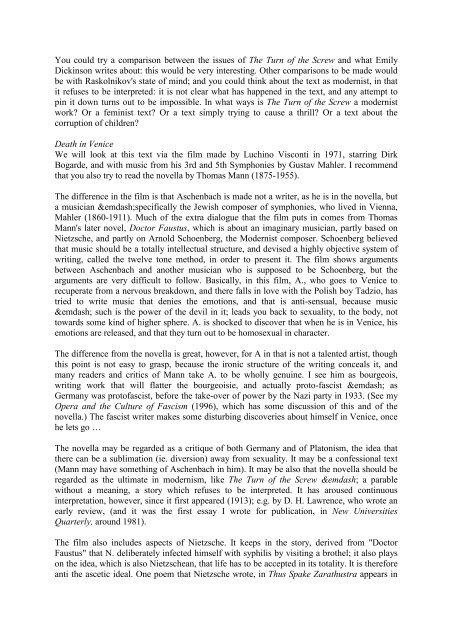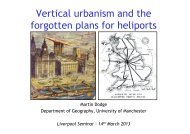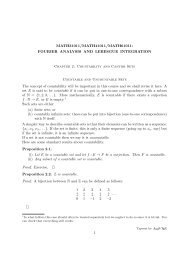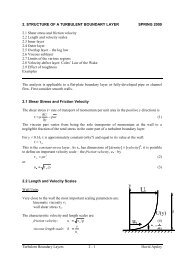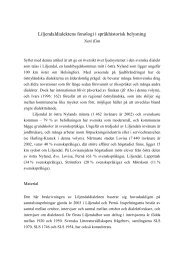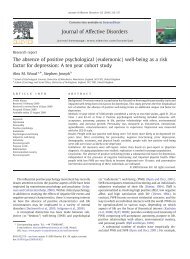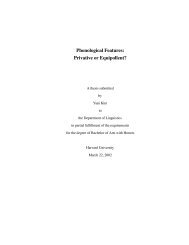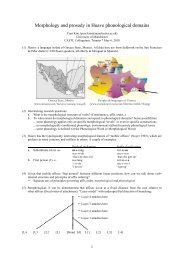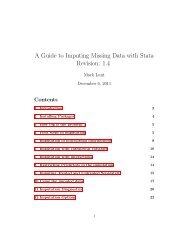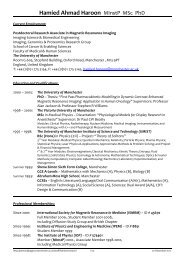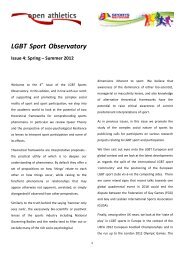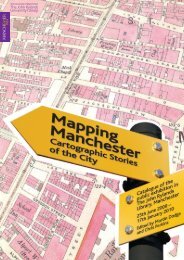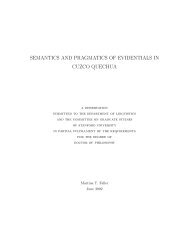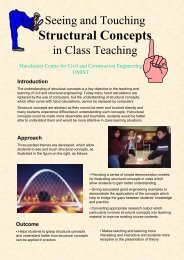Crime and Punishment The most important things to read on this are ...
Crime and Punishment The most important things to read on this are ...
Crime and Punishment The most important things to read on this are ...
Create successful ePaper yourself
Turn your PDF publications into a flip-book with our unique Google optimized e-Paper software.
You could try a comparis<strong>on</strong> between the issues of <str<strong>on</strong>g>The</str<strong>on</strong>g> Turn of the Screw <str<strong>on</strong>g>and</str<strong>on</strong>g> what Emily<br />
Dickins<strong>on</strong> writes about: <strong>this</strong> would be very interesting. Other comparis<strong>on</strong>s <str<strong>on</strong>g>to</str<strong>on</strong>g> be made would<br />
be with Raskolnikov's state of mind; <str<strong>on</strong>g>and</str<strong>on</strong>g> you could think about the text as modernist, in that<br />
it refuses <str<strong>on</strong>g>to</str<strong>on</strong>g> be interpreted: it is not clear what has happened in the text, <str<strong>on</strong>g>and</str<strong>on</strong>g> any attempt <str<strong>on</strong>g>to</str<strong>on</strong>g><br />
pin it down turns out <str<strong>on</strong>g>to</str<strong>on</strong>g> be impossible. In what ways is <str<strong>on</strong>g>The</str<strong>on</strong>g> Turn of the Screw a modernist<br />
work? Or a feminist text? Or a text simply trying <str<strong>on</strong>g>to</str<strong>on</strong>g> cause a thrill? Or a text about the<br />
corrupti<strong>on</strong> of children?<br />
Death in Venice<br />
We will look at <strong>this</strong> text via the film made by Luchino Visc<strong>on</strong>ti in 1971, starring Dirk<br />
Bogarde, <str<strong>on</strong>g>and</str<strong>on</strong>g> with music from his 3rd <str<strong>on</strong>g>and</str<strong>on</strong>g> 5th Symph<strong>on</strong>ies by Gustav Mahler. I recommend<br />
that you also try <str<strong>on</strong>g>to</str<strong>on</strong>g> <str<strong>on</strong>g>read</str<strong>on</strong>g> the novella by Thomas Mann (1875-1955).<br />
<str<strong>on</strong>g>The</str<strong>on</strong>g> difference in the film is that Aschenbach is made not a writer, as he is in the novella, but<br />
a musician &emdash;specifically the Jewish composer of symph<strong>on</strong>ies, who lived in Vienna,<br />
Mahler (1860-1911). Much of the extra dialogue that the film puts in comes from Thomas<br />
Mann's later novel, Doc<str<strong>on</strong>g>to</str<strong>on</strong>g>r Faustus, which is about an imaginary musician, partly based <strong>on</strong><br />
Nietzsche, <str<strong>on</strong>g>and</str<strong>on</strong>g> partly <strong>on</strong> Arnold Schoenberg, the Modernist composer. Schoenberg believed<br />
that music should be a <str<strong>on</strong>g>to</str<strong>on</strong>g>tally intellectual structure, <str<strong>on</strong>g>and</str<strong>on</strong>g> devised a highly objective system of<br />
writing, called the twelve <str<strong>on</strong>g>to</str<strong>on</strong>g>ne method, in order <str<strong>on</strong>g>to</str<strong>on</strong>g> present it. <str<strong>on</strong>g>The</str<strong>on</strong>g> film shows arguments<br />
between Aschenbach <str<strong>on</strong>g>and</str<strong>on</strong>g> another musician who is supposed <str<strong>on</strong>g>to</str<strong>on</strong>g> be Schoenberg, but the<br />
arguments <strong>are</strong> very difficult <str<strong>on</strong>g>to</str<strong>on</strong>g> follow. Basically, in <strong>this</strong> film, A., who goes <str<strong>on</strong>g>to</str<strong>on</strong>g> Venice <str<strong>on</strong>g>to</str<strong>on</strong>g><br />
recuperate from a nervous breakdown, <str<strong>on</strong>g>and</str<strong>on</strong>g> there falls in love with the Polish boy Tadzio, has<br />
tried <str<strong>on</strong>g>to</str<strong>on</strong>g> write music that denies the emoti<strong>on</strong>s, <str<strong>on</strong>g>and</str<strong>on</strong>g> that is anti-sensual, because music<br />
&emdash; such is the power of the devil in it; leads you back <str<strong>on</strong>g>to</str<strong>on</strong>g> sexuality, <str<strong>on</strong>g>to</str<strong>on</strong>g> the body, not<br />
<str<strong>on</strong>g>to</str<strong>on</strong>g>wards some kind of higher sphere. A. is shocked <str<strong>on</strong>g>to</str<strong>on</strong>g> discover that when he is in Venice, his<br />
emoti<strong>on</strong>s <strong>are</strong> released, <str<strong>on</strong>g>and</str<strong>on</strong>g> that they turn out <str<strong>on</strong>g>to</str<strong>on</strong>g> be homosexual in character.<br />
<str<strong>on</strong>g>The</str<strong>on</strong>g> difference from the novella is great, however, for A in that is not a talented artist, though<br />
<strong>this</strong> point is not easy <str<strong>on</strong>g>to</str<strong>on</strong>g> grasp, because the ir<strong>on</strong>ic structure of the writing c<strong>on</strong>ceals it, <str<strong>on</strong>g>and</str<strong>on</strong>g><br />
many <str<strong>on</strong>g>read</str<strong>on</strong>g>ers <str<strong>on</strong>g>and</str<strong>on</strong>g> critics of Mann take A. <str<strong>on</strong>g>to</str<strong>on</strong>g> be wholly genuine. I see him as bourgeois,<br />
writing work that will flatter the bourgeoisie, <str<strong>on</strong>g>and</str<strong>on</strong>g> actually pro<str<strong>on</strong>g>to</str<strong>on</strong>g>-fascist &emdash; as<br />
Germany was pro<str<strong>on</strong>g>to</str<strong>on</strong>g>fascist, before the take-over of power by the Nazi party in 1933. (See my<br />
Opera <str<strong>on</strong>g>and</str<strong>on</strong>g> the Culture of Fascism (1996), which has some discussi<strong>on</strong> of <strong>this</strong> <str<strong>on</strong>g>and</str<strong>on</strong>g> of the<br />
novella.) <str<strong>on</strong>g>The</str<strong>on</strong>g> fascist writer makes some disturbing discoveries about himself in Venice, <strong>on</strong>ce<br />
he lets go …<br />
<str<strong>on</strong>g>The</str<strong>on</strong>g> novella may be regarded as a critique of both Germany <str<strong>on</strong>g>and</str<strong>on</strong>g> of Pla<str<strong>on</strong>g>to</str<strong>on</strong>g>nism, the idea that<br />
there can be a sublimati<strong>on</strong> (ie. diversi<strong>on</strong>) away from sexuality. It may be a c<strong>on</strong>fessi<strong>on</strong>al text<br />
(Mann may have something of Aschenbach in him). It may be also that the novella should be<br />
regarded as the ultimate in modernism, like <str<strong>on</strong>g>The</str<strong>on</strong>g> Turn of the Screw &emdash; a parable<br />
without a meaning, a s<str<strong>on</strong>g>to</str<strong>on</strong>g>ry which refuses <str<strong>on</strong>g>to</str<strong>on</strong>g> be interpreted. It has aroused c<strong>on</strong>tinuous<br />
interpretati<strong>on</strong>, however, since it first appe<strong>are</strong>d (1913); e.g. by D. H. Lawrence, who wrote an<br />
early review, (<str<strong>on</strong>g>and</str<strong>on</strong>g> it was the first essay I wrote for publicati<strong>on</strong>, in New Universities<br />
Quarterly, around 1981).<br />
<str<strong>on</strong>g>The</str<strong>on</strong>g> film also includes aspects of Nietzsche. It keeps in the s<str<strong>on</strong>g>to</str<strong>on</strong>g>ry, derived from "Doc<str<strong>on</strong>g>to</str<strong>on</strong>g>r<br />
Faustus" that N. deliberately infected himself with syphilis by visiting a brothel; it also plays<br />
<strong>on</strong> the idea, which is also Nietzschean, that life has <str<strong>on</strong>g>to</str<strong>on</strong>g> be accepted in its <str<strong>on</strong>g>to</str<strong>on</strong>g>tality. It is therefore<br />
anti the ascetic ideal. One poem that Nietzsche wrote, in Thus Spake Zarathustra appears in


